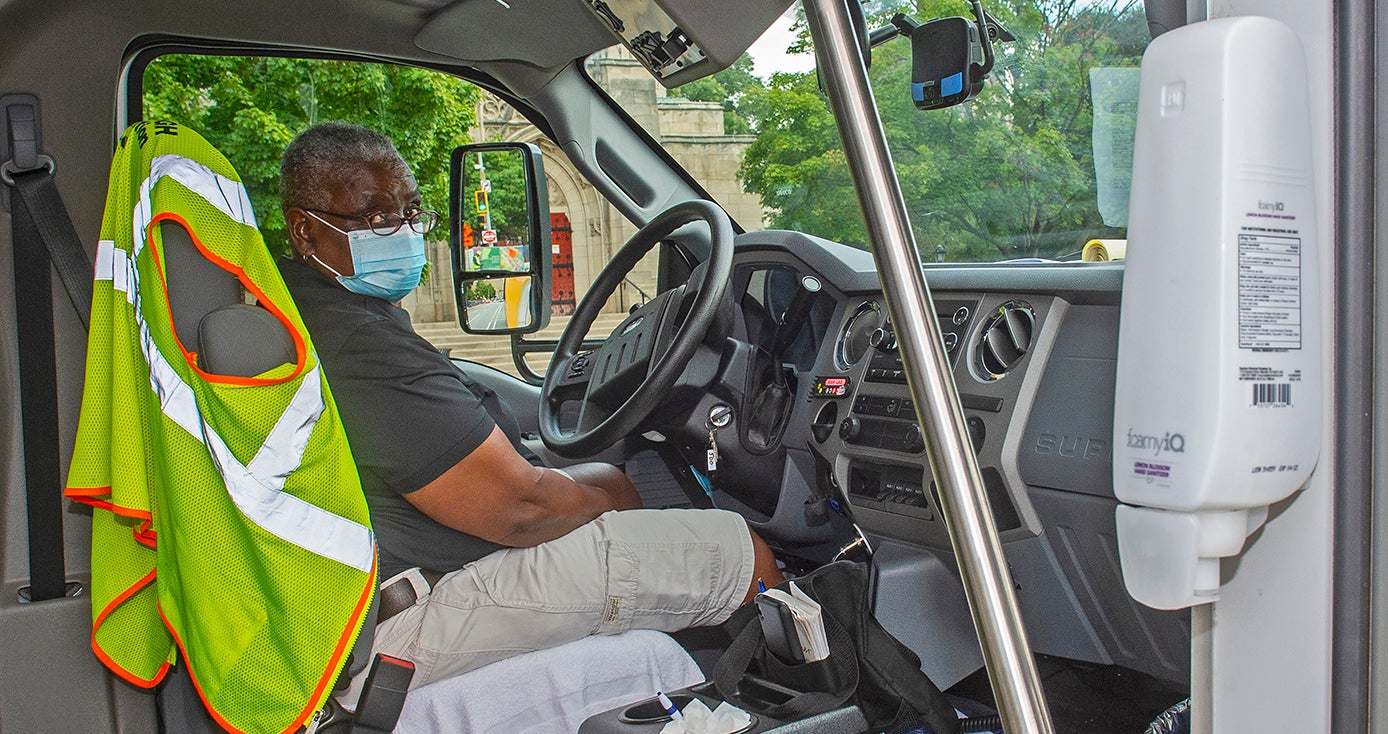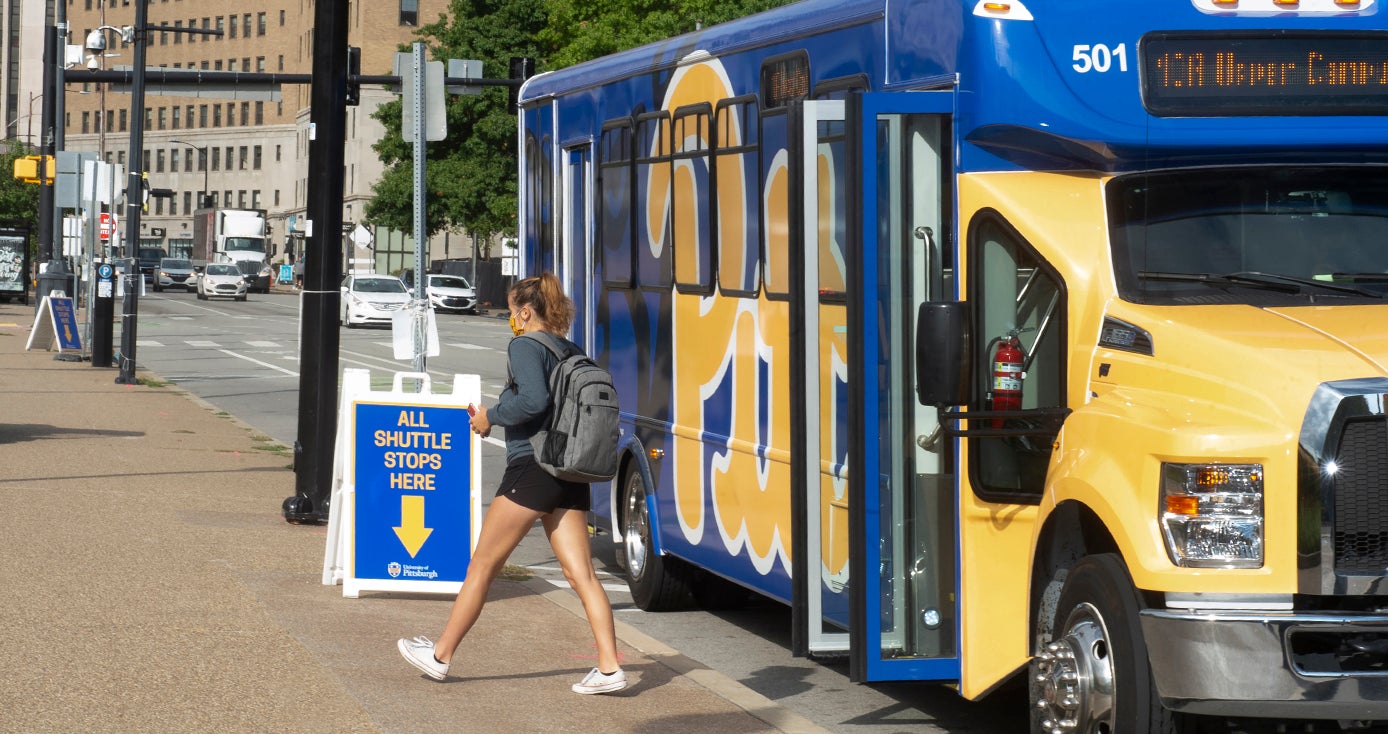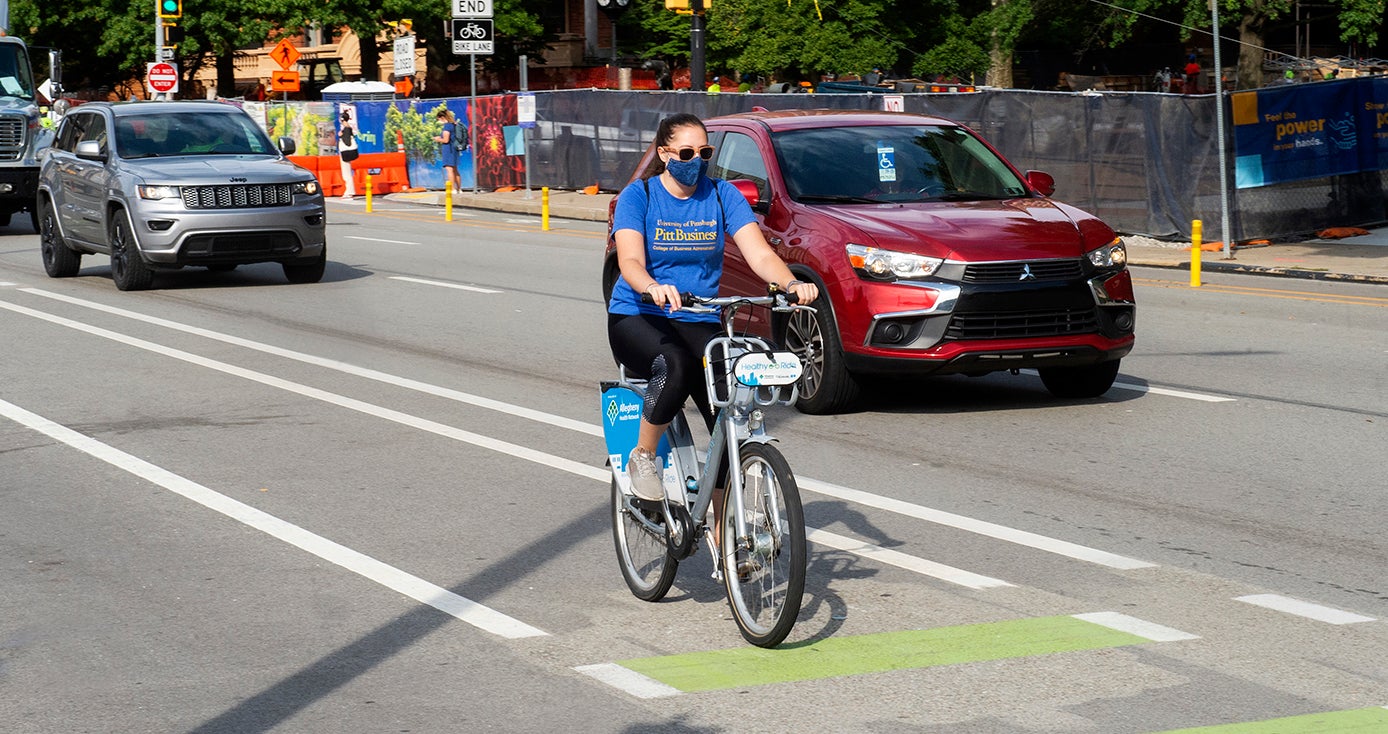
Subscribe to Pittwire Today
Get the most interesting and important stories from the University of Pittsburgh.Transportation 101: Getting Around on Campus
Between COVID-19 and campus construction, transportation looks a bit different at Pitt this fall.
But, whether on foot or on wheels, there’s more than one way to get around conveniently on campus.
Here’s what you need to know:
Transit
As of July 1, a new partner, Pittsburgh Transportation Group, is operating the University’s campus shuttles using an all-new fleet of 20 propane-powered shuttle buses equipped with passenger-counting technology and WiFi.
The shift to propane-powered vehicles will help the University move toward its carbon neutrality goals. “These shuttles are more fuel efficient and emit less carbon than comparable diesel or gasoline-powered vehicles,” said Kevin Sheehy, assistant vice chancellor of Auxiliary Operations and Finance. The new shuttles will cut shuttle-related carbon dioxide emissions by 33% and nitrogen oxide emissions by 20%, the equivalent of emissions from 44 passenger vehicles.
Sanitizer stations have been installed on the shuttles and drivers are masked. Passengers must have face coverings, too. For safety, drivers have a limited supply of extras to share with any rider who has forgotten a face covering, Sheehy said.
High-touch points on the shuttles are being cleaned throughout the day and each shuttle gets a deep cleaning at night when it returns to the garage, he said.
Safety and distancing protocols are in force at transit stops as well as on the vehicles themselves, Sheehy said.
Seating capacity has been reduced, with some seats marked with red “seat unavailable” stickers for physical distancing. Additional shuttle vehicles have been added on key routes at peak times to offset the distancing requirements, Sheehy said.
Shuttle routes
Campus shuttles are operating on routes to the upper campus, North Oakland, South Oakland, the Biotech Center and Bridgeside Point. A shuttle stop has been added at the Residence Inn at Bigelow, which is among the hotels being used for student housing.
Route details can be found on the PTS transportation page and real-time tracking is available on the Pitt shuttle tracker. Watch for a new version of the GPS app, which will provide not only the location of each shuttle, but also has real-time capacity to inform riders whether seats are available as the shuttle approaches.
Port Authority transit
Pittsburgh campus Pitt ID holders also can tap their University ID to ride Port Authority buses, T light rail and inclines fare-free.
Rider capacity has been reduced to maintain physical distancing and masks are required. Safety information and rider tips are on the Port Authority’s SafeToGo page. Its Room2Ride tool, helpful for those with flexible schedules, shows average capacities at major stops throughout the system, and a True Time tool shows capacity on specific vehicles in real time.
Bicycling
Pitt has a strong and active bicycling community. Watch the University Calendar for details on virtual Bike to Campus week activities Sept 21-25. Streaming sessions will include a “Welcome New Riders” series featuring information on topics including buying a bike or an e-bike, basic traffic skills, what to wear, how to use trails, and other sessions focused on equipping new riders with knowledge helpful to riding to campus.
An expanded partnership with Healthy Ride, Pittsburgh’s bike share system, has brought unlimited free 30-minute rides to all Pittsburgh campus students and employees.
Individuals seeking their personalized account activation codes should search their inboxes for the Aug. 11 or Sept. 3 Pittwire email titled “Free 30-Minute Bike Rides: Get Your Access Code” or email healthyride [at] pitt.edu. Information sessions on the benefit are posted on the Pitt Sustainability YouTube channel.
Cyclists with their own bikes may rent individual bicycle lockers, located near Sutherland Hall and Posvar Hall, by the semester.
Bicycle racks, bike rooms and fix-it stations across campus can be found on the Campus Bike Resources Map. The Bike Cave, a maintenance and repair space open to all, is located in the Posvar Hall Passage. Visit The Bike Cave Facebook page for hours of operation, appointment details and information on bikes for sale.
All cyclists are encouraged to register their bikes online to help in case a bike is lost or stolen, and to secure their bikes with a U-lock when parked on campus.
More mobility just around the corner
An end is in sight for detours around the Cathedral of Learning and William Pitt Union as construction on the Bigelow Block Transformation Project nears an anticipated October completion.
For pedestrians, the greener multimodal design expands sidewalks and crosswalk lanes and realigns the midblock crosswalk. It also adds bike lanes and upgrades the transit stop area.
Can’t wait to see it? Get a peek at the progress through the Hillman Library or Cathedral of Learning webcams.
Parking on campus
Parking flexibility has been added to accommodate faculty and staff, many of whom are continuing to work remotely.
Permit holders who are not coming to campus regularly may place their permit on hold indefinitely by filling out a request form.
Through a partnership with ParkMobile, $5 daily parking is available for those who are approved to work on campus. Parking is subject to availability at the OC, OH, RA, A, U, PH, SO and MP lots, and additional locations are being considered, Sheehy said.
A ParkMobile account is required. Accounts can be created by downloading the ParkMobile app, online at parkmobile.com or by calling 1-877-727-5281.
A more sustainable fleet
Pitt’s own fleet of vehicles, including trucks and vans, are on the road to greater sustainability, too. A new agreement with Enterprise Fleet Management will provide electric and hybrid vehicles in support of the University’s commitment to making the campus carbon neutral by 2037.
Enterprise will deliver 32 new vehicles to start, including pickup trucks, cargo vans and passenger vans. Overall, it will lease 268 vehicles to Pitt. The agreement is projected to save the University $750,000 over the next five years.




